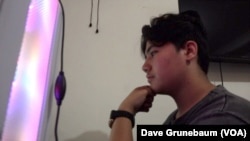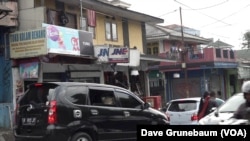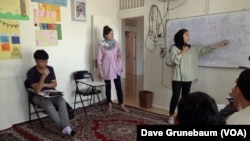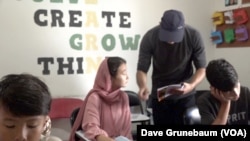In a middle school level class, students are learning about planetary science from the gases of Jupiter to the exosphere on Mercury.
That might seem no different than lessons at many schools around the world, but this session is happening at a learning center for refugees in Indonesia.
Paying close attention is Afnaan Guleid, a 13-year-old whose family fled from Somalia to the Southeast Asian country. She said in her native country her family had to worry about violence, but now she can focus on her dreams.
“I want to be a scientist when I grow up because I love to do experiments and discover things,” Guleid said.
She is one of the 85 students at the Cisarua Refugee Learning Center. The entire curriculum is in English, whether the students are learning math, science, social studies or basic life skills. And beginning this year, qualified students could join an online program to work toward an American high school diploma.
Massoud Azimi, 15, is one of them. Azimi is a refugee from Afghanistan who has been in Indonesia for eight years but, along with his family, is scheduled to be resettled in the United States within the next few months.
“The programs at this learning center are helping me prepare for school in America,” Azimi said. “It’s strengthening my academic skills.”
Cisarua is a town in the hills, a few hours’ drive from the country’s largest city, Jakarta, which has become a hub for many refugees in Indonesia.
A spokesperson for the United Nations refugee agency told VOA there are about 12,600 refugees and asylum seekers in the country and approximately 1,300 of them are in Cisarua.
Refugees said the town’s milder temperatures and lower cost of living compared with Jakarta make it an attractive place.
But most, if not all, of these refugees hope to eventually be resettled in a third country. The U.N. refugee agency said the United States, Canada, Australia and New Zealand are accepting refugees from Indonesia, but the process typically takes at least seven years and placement is not guaranteed.
While Indonesia allows refugees to enroll in public schools, the Cisarua Refugee Learning Center offers its students a chance to focus on their English, which is a skill they will need if they are resettled.
“We are trying to prepare them for the next country that they are going,” said Reza Hussaini, the school’s principal, who is a refugee himself from Afghanistan.
The learning center has refugees who fled violence or persecution in countries in Asia and Africa, including Yemen, Iraq, Sudan, and Myanmar. “We have students from different cultures, students from different religions, students from different countries,” Hussaini said. “There is a diversity of culture here.”
Zahra Sakhawat is a 12-year-old from Afghanistan who dreams of becoming a doctor. She said the students at this learning center feel a connection because it fosters a sense of community.
“Everyone is very kind and dear with each other,” she said.
The facilities are basic, no high-tech science labs. The learning center is funded entirely by private donations. There are also English classes for adults, which often attracts parents of the students.
All the teachers are volunteers, and many are refugees themselves, including a 39-year-old man whose identity VOA agreed to conceal out of concerns for his family’s safety in his native Myanmar. He fled the country’s civil war just four months ago because Myanmar’s junta, which staged a coup in 2021 was about to conscript him into the army.
“They were going to force me to fight for their military. So, I will not do it because I will never help the military,” he said. He has a university degree in computer science and hopes he will have a chance to study artificial intelligence in a new country.
In the meantime, he said he is enjoying the opportunity to share his computer and math knowledge as a volunteer at the Cisarua Refugee Learning Center. The school started 10 years ago and has become a model for similar refugee programs that have opened elsewhere in Indonesia.
“All of the refugees deserve a chance to prepare for their futures,” Hussaini said.






